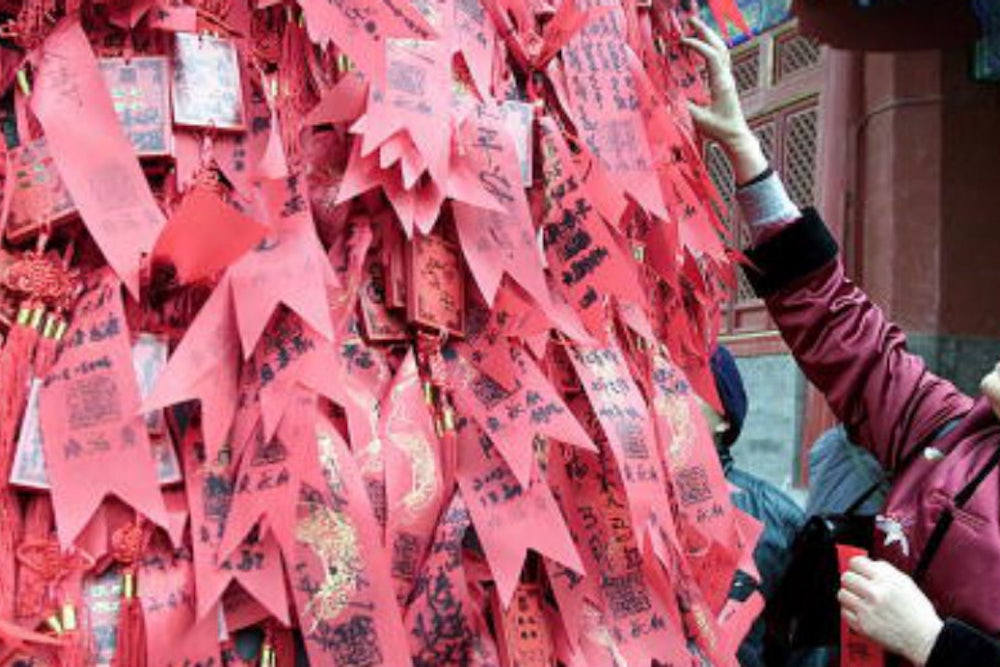There’s a Chinese joke about a boss who’s looking through applications for a job at his company. When his secretary glances over, she sees that he’s not even reading the applications—he’s simply pulling sheets from the pile at random and throwing them in the trash. “What are you doing?” she asks him. “I don’t want to hire anyone who’s unlucky,” he replies.
It’s funny because it’s true—in China, at least. Many people take matters of fortune seriously here, whether it’s fengshui, the Chinese zodiac, or, increasingly, Western astrology. It’s hard to quantify the popularity of horoscopes in China, but a 2007 survey by China Youth Daily and the website Sina found that out of more than 3,000 respondents, 92.4 percent said they paid attention to horoscopes. (About a third said they believed in astrology absolutely.) Major web portals like Baidu, QQ, and Sina, all have astrology sections, and “astrological sign” was the fifth most popular mobile search term on Baidu in 2013 (after “weather,” “train ticket,” “lottery,” and “price of gold”).
Horoscopes in China can influence big decisions like whom to hire, whom to date, and whom to befriend, with astrological signs serving, like they do in the U.S., as markers of personality—Leos are dominant, Aries are spontaneous, Capricorns are stubborn, etc.—as well as compatibility. The difference is in degree. In China, dating show contestants regularly accept or reject potential matches based on their signs, and astrology is a common conversation topic on first dates. Gossip magazines devote pages to the horoscopes of celebrities. (Blake Lively likes Libras.) One young job applicant in Chongqing reportedly turned down a position because she was a Leo and her would-be boss was a Pisces.
In this astrological version of natural selection, no one has it tougher than Virgos, born between Aug. 23 and Sept. 22. The persecution is mostly playful. This month, Virgos have been taking a ribbing online for the usual sins: They’re picky, they’re spoiled, they’re fussy to the point of being obsessive-compulsive. One meme circulating online had WeChat users posting an array of eight photos—one photo short of a perfect three-by-three square—in order to annoy their Virgo friends. A website urged users to “drive Virgos crazy” by changing their WeChat profile photos so it looked like their friends always had one unread message from them. An informal poll of my Chinese friends confirmed that Virgos get a bad rap. “Virgos are evil through-and-through,” said Xu Yang, 31. (He later added that he was kidding.) “My brother is a Virgo, and we don’t get along well because he’s been spoiled,” said Nancy Wu, age 27. “Then again, Keanu Reeves is a Virgo, so it’s hard to say.”
But astrology-based discrimination is real. An online survey conducted by Sina this week asked, “Which astrological sign has the most trouble finding work?” Virgo won—well, lost—by a long shot. While companies don’t usually rule out Virgos explicitly, they will emphasize the kind of people they do hire: One Hong Kong travel agency wrote in a job posting that it was looking to hire a Gemini, Libra, or Aquarius. A real estate company in Ningbo reportedly rejected an applicant because he was a Scorpio.
This year, Virgos are fighting back. A group of Weibo users launched a hashtag campaign in August to take back the word “Virgo.” (The hashtag itself, #为处女座正名#, might be translated as “Rectify the Name of Virgo,” a reference to the Confucian doctrine of “rectification of names,” or assigning things their proper name.) One much-forwarded post put positive spin on various Virgo-like qualities: “Nothing will stop a Virgo from completing a goal.” “Virgos don’t like being around people all day, every day.” “Virgos mostly rely on the themselves.” Companies have gotten on the bandwagon, too. The e-commerce website Juhuasuan ran a jokey recruitment ad on an LCD billboard in Times Square announcing a “global search for Virgos.” (Juhuasuan is part of Alibaba, whose CEO, Jack Ma, is a famous Virgo.) The air conditioner manufacturer Haier posted a message online saying that Virgos “might have OCD, fear dirt, and be endlessly picky. But that’s because, like Haier central air conditioners, they’re always seeking perfection!”
Why the obsession with Virgos? I asked Felicia Jiang, who runs the popular Chinese astrology website NoDoor.com. “Virgos are perfectionists, so they’ll often criticize other people,” she said. “It’s easy to notice, and easy to exaggerate.” Jiang pointed out that, as with all signs, Virgos’ weaknesses are also their strengths. Their attention to detail, while potentially irritating, actually makes them excellent workers, she said: More than half of the 19 employees at NoDoor.com are Virgos.
As for the rise of astrology in China, Jiang suggested that it stemmed from young people feeling lost amidst crippling pressures. “They’re wondering, ‘Who am I? What should I be doing?’” she said. “They lack guidance.” Thanks to the Internet, astrology information is now widely available, and horoscope columns have flourished online. (One major horoscope website has more than 10 million followers on Weibo.) While the government doesn’t explicitly oppose astrology, it doesn’t encourage the practice either. In 2013, the Beijing Evening News ran a long report with the headline: “No Relationship Between Astrological Signs and Personality: Scientists.” Sounds like something a Virgo would say.
